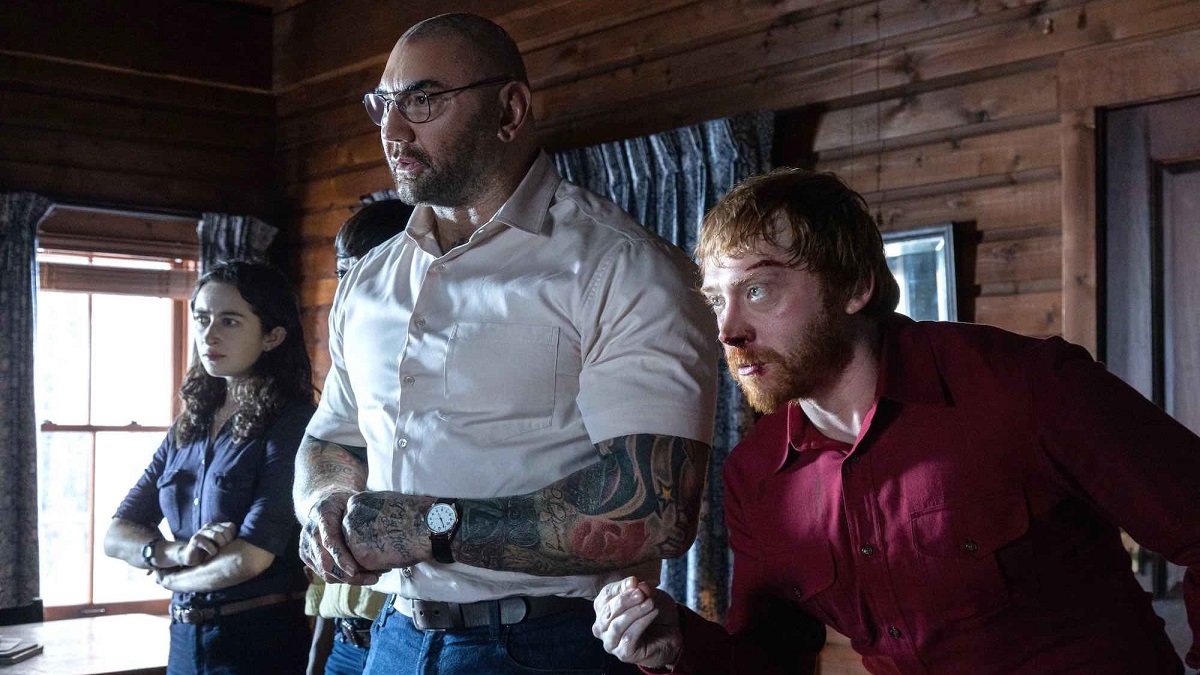In M. Night Shyamalan’s Knock at the Cabin, we first meet nine year-old Wen (played with an adult insouciance by Kristen Cui in her first film) collecting grasshoppers in a glass jar. Shyamalan clearly wants these grasshoppers to serve as a central metaphor for the action to come as Wen and her fathers Eric and Andrew (capably played by Jonathan Groff and Fleabag’s Ben Aldridge) are kept captive in the titular cabin by four doomsday cultists who have apparently been led to the family by a vision.
The real metaphor for the film is star Dave Bautista, though, the wrestler-cum-Marvel superstar, miscast here as a supposedly normal Chicago schoolteacher turned leader of the cult holding Wen and her fathers hostage. He informs the trio that he and his compatriots had been led to the cabin by a vision that an encroaching apocalypse could only be stopped if one member of the family kills another.
In a story like this, especially one by Shyamalan, there’s supposed to be a sense of building suspense as the audience wonders if the quartet of unrelated citizens brought together to act as an ad hoc Four Horsemen are telling the truth. We’re supposed to spend Knock at the Cabin‘s 100-minute run time trying to figure out if the quartet are lying for their own nefarious ends, or if they are just a collective of psychotics sharing a delusion.
This is completely undermined by the casting of Bautista, who certainly possesses the deadpan charisma of a dark prophet who might convince a group of strangers to join his doomsday cult. However, he is also such a larger-than-life figure with such an off-kilter intensity that there’s never a question that whatever is going on in this world, the otherworldly and bizarre explanation is the only one that makes sense.
Shyamalan, who also co-wrote the script, does his supporting cast no favors by giving them little to nothing to work with in terms of character development. Aldridge’s Andrew spends the entire film insisting that the four are lying in the face of mounting evidence to the contrary, while Groff’s Eric plays the voice of reason unless the script arbitrarily calls for him to do a reversal.
Rupert Grint, still best known for playing Ron Weasley in the Harry Potter films, steps out of his lane to play a one-note Boston bartender with a flat Midwestern accent. Halfway through, a mystery pops up out of nowhere as to his identity, and it’s resolved almost exactly 20 minutes later with no effect or impact on the story. Just as the grasshoppers are forgotten and never mentioned again after the story proper begins, so too do plot threads appear and then disappear with no impact on the central characters.
While it’s tempting to blame the cast, the truth is that Shyamalan has failed them as well. Which is surprising, because he’s proven in the past that, even in some of his worst films, he knows how to get the most out of an ensemble of actors. If Groff and Aldridge had been meant to be a couple whose marriage looks fine on the surface but reveals its cracks as soon as any pressure is applied, their performances here would make sense, but the extensive use of flashbacks to their courtship and adoption of Wen only prove that they’re supposed to be a model couple.
The cinematography by the team of Jarin Blaschke (The Lighthouse) and relative newcomer Lowell A. Meyer deserve a special commendation here, as more than anything else their lighting and color choices help build a sense of dread. Unfortunately their work is undercut by director Shyamalan, who constantly makes choices – like keeping Bautista in a tight extreme closeup for most of the first 10 minutes – that theoretically seem sound, but are either distracting or just plain off.
The biggest flaw, as is true with many of Shyamalan’s lesser efforts, is that there is a much better film within the one that Shyamalan presents us here. Much of that lies in the ways in which Shyamalan, in rewriting the original draft by Steve Desmond and Michael Sherman, chooses to deviate from The Cabin at the End of the World, the original novel that served as source material.
Without giving away any plot points, it’s sufficient to say that Shyamalan not only pulled his punches here, but also displayed a lack of trust in his audience to deal with some of the more upsetting developments in the original story. If Shyamalan wishes to emulate the filmography and career of suspense icon Alfred Hitchcock, in this film he does not display the master’s ability to lead the viewer right to the edge of horror without pushing them over.
More forgiving fans of the director will appreciate it, and it will definitely find its cult following once it slinks out of theaters and onto a streaming service where viewers can sit with their laptops and ignore 50 percent of the story, acting, and dialogue. But for anyone who wishes to pay to lose themselves in a scary movie, they will more than likely find themselves completely checked out by the time the completely unearned ending rolls.
Disappointing
Only M. Night Shyamalan could make an apocalypse film that has audiences rooting for the end of the world, if only to bring the running time of 'Knock at the Cabin' to a merciful end.
Knock at the Cabin

